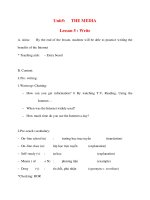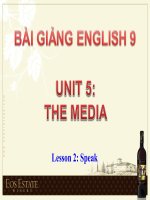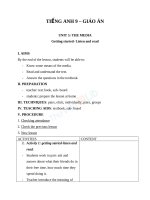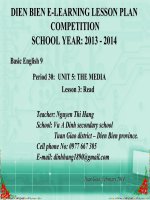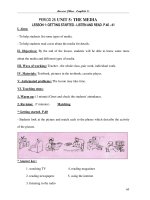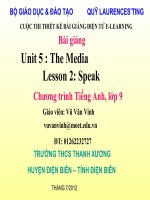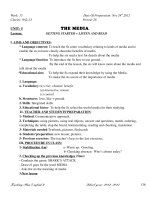Giáo án Tiếng Anh 9 Unit 5: The media
Bạn đang xem bản rút gọn của tài liệu. Xem và tải ngay bản đầy đủ của tài liệu tại đây (176.5 KB, 19 trang )
TIẾNG ANH 9 – GIÁO ÁN
Unit5:
Lesson 1:
THE MEDIA
Getting started
Listen and read
I. Objectives: Ss get acquanted with the new topic- the media. The students
know basic means of communications such as: newspapers, magazine, TV,
interactive TV
II. Language contents :
1. Vocabulary : .
2. Structure :
- The past simple tense; indirected speech
3. Skills : Listening, speaking, reading and writing.
III. Teaching aids : Textbook, cassette, some newspapers, some magazines
IV. Procedure :
TEACHER’S & STUDENTS’ ACTIVITIES
*Warm – up : Chatting
- T. asks sts: What do you do in your free
time?
- Ss. answer
CONTENT
UNIT 5: THE MEDIA
Period 27 : GETTING STARTED +
LISTEN AND READ
- T. leads sts to the “ getting started”
* Getting started :
* Getting started :
T. shows sts some pic- and asks: What is Work with a partner. Ask and answer
he/she doing?
questions about your favorite activities
• Ps. answer
and how much time you spend on each
o T. introduces the lesson: the media activity
(Nowaday media has become very popular Example:
in our life. In this lesson, we learn about
this interesting topic.)
o T. What of these is your favorite activity in
your free time?
o Ps. answer: watching TV . . .
o T. How many hours a week do you spend
watching TV?
o Ps. About 4 or 5 hours , I guess
o What of these is your favorite
activity in your free time?
o Watching TV .
o How many hours a week do you
spend watching TV?
o About 4 or 5 hours , I guess
* New words :
o T. work with a partner. Ask and answer
questions about your favorite activities
crier: (n) người loan tin
and how much time you spend on each
remote control:(n) điều khiển từ xa
activity
thank to :(v) nhờ có
o Ps. called to practice before class
lastest :(adj) mới nhất
* Listen and read :
a variety of:nhiều, đa dạng
- T. shows sts apis- of a crier , remote control and
interactive
some open questions to teach new words
TV:(n)truyền
hình
tương tác
crier: (n)
show:(n) chương trình truyền hình
remote :(n)
game show:(n) chương trình trò
thank to :(v)
chơi trên truyền hình
lastest :(adj)
talk show: (n) chương trình toạ
a variety of:
đàm bình luận
interactive TV:(n)
benefits: (n) lợi ích
show:(n)
bring about:(v) đem lại , mang lại
game show:(n)
talk show: (n)
benefits: (n)
a) Complete the table with the passage
bring about:(v)
letters in which these facts or events are
mentioned.
- T. lets sts listen to the tape
- Ss. then read the passages and fill in the
passages letters in which the fact and events
Facts & events
Passage
1. Remote controls are used
letters
D
to interact with TV
2. One of the most popular
B
magazine
3. People od different ages
B
1. Remote controls are used to
like this magazine
4. Benefit of TV
5. People got the news
C
D
interact with TV
2. One of the most popular
from town criers
6. Interactive
A
magazine
3. People od different ages like
available now
mentioned
- Ss. changed the results with their friends.
- Ss. read the passages (individuals)
- T. has sts read them and corrects.
Facts & events
Passage
letters
this magazine
4. Benefit of TV
5. People got the news from
town criers
TV
is
b) Answer the questions
1. A town crier waa a person whose
job was to go through city streets
ringing a bell to shout the lastest
6. Interactive TV is available
new as he was walking.
2. The Kien Thuc Ngay Nay is one
now
of the most popular magazine and
- Ss. asked to read the passages again and and
answer the questions.(work with a partner)
- Ss. ask and answer before class.
- Ss. others may write the answers on the board.
- T. corrects
and adults.
3. People
1. System for producing on a screen visual
images trasmitted with sound.
2. Transmission and repetition of messages by
electro- magnetic waves without
connecting wires.
3. Printed publiccation usually daily or weekly
with news, ect.
4. An electronic machine for performing
caculations automatically.
- T. helps them to do
R A D I
O
S I
O N
get
inexpensive
international
-T. now you find words mean:
E V I
can
the
lastest
information and enjoy inteesting
and
* Consolidation :
T E L
is widely read by both teenagers
local
programs
and
in
a
convenient way.
4. I read Muc Tim (Ao Trang, Cong
An Thanh Pho…)
5. My favorite type of media is TV
( newspaper…)
N E W S P A P E R
C O M P U T E R
Ps. find key word
I D A M E
MEDIA
* Homework :
Asks students :
- Learn their lesson.
-
Do the exercises 1, p.35 in the workbook
- Prepare the lesson : Speak for the next
period
-
Unit5:
THE MEDIA
Lesson 2: Speak - Listen
I. Aims :Ss practice widening the topic- the media. Ss are supplied a series
of TV shows being broadcast such as: documentary, children’s corner,
weather forecast…
II. Language contents :
1. Vocabulary : dormitory (n) ; on compus (adv) ; reputation (n) . . .
2. Structure :
- Tag- questions
3. Skills : speaking.
III. Teaching aids : Textbook, cassette, sub board
IV. Procedure :
TEACHER’S & STUDENTS’
CONTENT
ACTIVITIES
*Warm – up : Netword
-T. asks students to list of TV programs.
* New words :
- Ss. .draw two networds (two groups)
-T. remarks and gives marks and introduces
-
folk
music:
some new words
chương
Pre- speaking.
nhạc cổ truyền
- T. introduces the dialogue
-
- Ss. listen
- T. helps Ps learn some new words and
reminds them tag- questions
cartoon:
trình
phim
hoạt hình
-
literature
and
art: Văn học
- Ss. practice the dialogue with their partner
While- speaking.
-T. Now make similar dialogues. Talk
Nghệ Thuật
-
news: Thời sự
-
safe
about the programs you like and dislike .
traffic
news: Bản tin
an toàn giao
- Ss. make dialogues
thông
Post- speaking
-
drama: kịch
- Ss. Play the roles before class
-
documentary:
- T. corrects
Suggested answer
Phim tài liệu
-
khoẻ cho mọi
Nam?
and some films are so violent. I don’t like
người
-
Hung: I’m opposite. I love watching films.
Nam: But you watch Wildlife World, don’t
-
know about animals and faraway places.
Hung: No, I don’t
of
nón kì diệu
-
The
price
is
right: Hãy chọn
giá đúng
-
Catch
phrase:
Đuổi hình bắt
Nam: I enjoy it, too. You don’t like drama, do
you?
Wheel
fortune: Chiếc
you?
Hung: Yes, every day. It’s very interesting to
Góc
thiếu nhi
They are wonderful. Music programs seem
quite boring to me.
Children’
corner:
watching them. I prefer Music programs
especial Song I love
for
everyone: Sức
Hung: You like watching TV, don’t you,
Nam: Not really. Some films are so boring
Health
chữ
-
Who wants to
be
a
Pre – listening :
millionaire?:
- T. Can you guess When ? or What?
Ai là triệu phú?
- T. explains some new words: printed
-
The road to the
newspapers, telegraph, major force, journalism
olumpia peak:
- Ss. guess
đường lên đỉnh
- T. Now you listen to the conversation
Olympia
between Chau and his father. Fill in the table
- Violent (adj)
with the information you hear.
- Informative (adj)
While listening :
- T. lets Ss listen to the tape and fill in the
Now make similar dialogues. Talk about
blanks ch.
the programs you like and dislike .
Post listening :
- Ss. exchange the results
-T. gives feedback and answer key.
* Homework :
Asks students :
- Practice ask and answer about the TV
programs.
- Learn words.
- Do the exercises 4;5 page 38-39 in the
workbook.
- Prepare the lesson for the next period: Read
(Unit 5 )
The answers:
a. The late 19th century
b. Radio and newsreels
c. In the 1950s
}The internet Tape transcript
Chaut: Dad, I’m doing an assignment. Can
you help me with the information.
Chau’s father:: What’s the assignment
about?
Chau:It’s about the impotant dates of the
media. Where and when did the first printed
newspaper appear, Dad?
Chau’s father: It first appeared in the7 th
century AD, in China.
Chau: And when was the telegraph
invented?
Chau’s father: Perhaps it was in the late 19
th
century. Do you knoe two forms of news
media appeared in the early 20 th century?
Chau:Radio and newsreels?
Chau’s father: Excellent! And when did the
television become commercially virable, can
you guess?
Chau: In the 1940s?
Chau’s father: No, It was in the 1950s.
Chau:When did the internet become a major
force in the journalism?
Chau’s father: In the mid and late 1990s.
Chau: Thank you, Dad. Now I can answer
all the questions of my assignment.
Unit5:
THE MEDIA
Lesson 3: Read
I. Aims : By the end of the lesson, students will be able to understand the
text in details.
II. Language contents :
1. Vocabulary : surf the webs (v); forum (n)…
2. Structure : Review
3. Skills : Speaking, reading and writing.
III. Techniques: answer given
IV. Teaching aids : Textbook, small board
V. Procedure :
TEACHER’S & STUDENTS’ ACTIVITIES
* Warm – up :
- T. Have you known about the internet?
CONTENTS
UNIT 5: MEDIA
Period 30: READ
- Ps. Yes, I have / No, I haven’t
- T. Have you used internet? What for?
- P1: chat; e-mail; get information...
* Pre – reading :
- T. Introduces the text : As we know the
internet has been a very important form of
media in our modern life. However, we may
not know all its benefits. In today’s lesson,
we will study the benefits and disadvantages
of the internet.
- T. intrduces some new words
- T. As you know, forum is a public meeting
where a certain topic is dicussed. Every
participant can engage in the discussion. A
*New words
Surf the webs (v)
Forum (n)
E-mail (n)
Benefit (n)
Get access (v)
Wander (v)
Time-consuming
Junk mail
forum on internet is similar. However, the
participants don’t meet in the person. They
post their ideas through a main website or a
mailng list.
The answers
Sandra uses the internet to get
- T. now you read three reponses in the forum information and to communicate with
about the internet. You scan the text and her friends and relatives.
match the following main ideas and the Because she lives in the countryside,
reponses.
where the internet is not available.
1. Students in the countryside can’t access to People use the internet foe education,
the internet.
communication, entertainment and
2. Internet is a wonderful invention.
commerce.
3. The internet can be limited in some ways.
The benefits of interne: It’s used for
* While reading :
mullti-
- Ps . read and match
purposes:
information,
for
for
getting
education,
1. Students in the countryside can’t access to communication, entertainment and
the internet.
commerce.
2. Internet is a wonderful invention.
Yes. There are some disadvantages.
3. The internet can be limited in some ways.
It’s
consuming,
costly,
1- Response # 2
dangerous because of viruses and bad
2- Response # 1
programs.
3- Response # 3
T Now you read and answer the questions below.
P. read and answer the questions
* Post reading :
- Ps. change the answers
- Ps. ask and answer. Then write the answer on
the board
- T. corrects if there are mistakes
* Homework :
-
time-
Asks students :
Write the answers in their noteboks
Learn their lesson.
Do the exercises 6,page ( 40)
Prepare the lesson for the next period :Write
( Unit 5 )
Unit5:
THE MEDIA
Lesson 4: Write
I. Aims : By the end of the lesson, students will be able to write a formal
letter of requiry to attend an
English course.
II. Language contents :
1. Vocabulary:
2. Structure : Review some structures.
3. Skills : writing.
III. Techniques :
IV. Teaching aids: Textbook, pictures, projector.
V. Procedure :
TEACHER’S & STUDENTS’
CONTENTS
ACTIVITIES
* Warm – up :
- T.shows sts an informal letter and * New words :
asks them how many sections there
- informal letter # formal letter
are and each section is about.
- requiry
1. Closing: love; regard …
- recipient :person who receives s.th
* Pre – writing :
T. shows sts the letter of Robinson asks sts to Suggested Passage:
differs
The internet has widely developed
The
recently and it has three main benefits.
Your si
Firstly, the internet has a plentiful and
reliable resource of information such as
* While writing :
news, articles and weather forecasts very
T. asks students to look at the outline fast and conveniently.The information is
and write
not only diversified but also very
updated. Second the internet is a very
* Post writing :
good way to entertain. We can listen to
T. asks students to change their writing music, watch videos and play games on
and compare with their partners and line. Besides, we can chat with friends
correct if they can.
and relatives who lives far away. It is a
T. chooses some writing to correct in very cheap means of communication.
front of the class.
Lastly, the internet provides a rich source
of educational materials and convenient
* Homework :
way to study. On the internet, we can
Asks students :
search a lot of websites which contain
Write the passage again in your useful guidelines and methods for study.
notebooks.
In addition, we can do on-line exercises
Learn their lesson.
and take on-line tests. We don’t need to
Do the exercise 6 ( page 40 )
go to school but we still complete the
Prepare the lesson : Language focus educational programs. Inconclusion, the
( Unit 5 ).
internet brings us lots of benefits which
make
our
life
more
modern
convenient
Unit5:
THE MEDIA
Lesson 5: Language fucus
I. Aims : Students will understand the use of adjectives and adverbs, adverb
of clause and the real
conditional sentence.
II. Language contents :
1. Vocabulary :
and
2. Structure :
3. Skills : writing
III. Techniques: matching, answer given
IV. Teaching aids : Textbook…
V. Procedure :
TEACHER’S & STUDENTS’ ACTIVITIES
* Warm – up : jumbled words
CONTENTS
1. Join the sentences. Use relative
clauses.
-T. write the words whose letters are not in Example:
order
- Tet is a festival. Tet occurs in late
- Ps. work in group and arrange the letters in January or early February.
order.
Tet is afestival which occurs in late
- WOLS , ASD, DOGO, PAHAPY, TERMEXE
January or early February.
- slow, sad, good, happy, extreme
a. Auld Lang Syne is a song which is
sung on New Year Eve.
1.Change the adjectives into adverbs. Then
b. This watch is a gift which was given
use the adverbs to complete the sentences.
to me by my aunt on my 14th
-T. asks sts about the position of adjective and
birthday
adverb in the sentence and the formation of
c. My friend Tom, who sings Western
adverbs
folk songs very well, can compose
-Ps. adj standing in front of noun and after to be.
songs.
Adv following ordinal verb. Adj + ly = adv
d. We often go to the town cultural
T. introduces the example and asks sts to change
house, which always opens on
the following into adv
public holidays.
Adjectives
Adverbs
e. I like reading books which tell about
Extreme
Good
Happy
Sad
slow
T. now you use these adv to fill in the blanks
Ps. finish them and read aloud sentence by
different peoples and their cultures.
f. On my mom’s birthday my dad gave
her rose, which were very sweet and
beautiful.
g. Judy likes the full-moon festival,
Which celebrated in mid-fall, very
sentence (individuals)
Ps. others remark
T. gives feedback
much.
h. Tomorrow, I’ll go to the airport to
meet my friends, who come to stay
2. Join the pairs of sentences together. Use
because, as or since
-T. gives sts two clauses:
Hoa didn’t go to school yesterday. She was sick.
-T. Why didn’t Hoa go to school?
- Ps. Because she was sick.
- T. This is adverb clause of reason. Conjuntions
two clauses are because / as / since
- T. gives sts ex in the textbook
-Ps. asked to join sent- into one , use
conjuntions because, as, since then change the
result with their partner
-T. gives feedback
3. Complete the dialogues. Use the words in
brackets
-T. gives examle: I am pleased that you are
working hard.
- Ps. analize the structure
with us during the Christmas.
2. Describe each of the people in the
pictures. Use relatives clause.
Example:
I am the boy who is wearing a white Tshirt.
My aunt Judy is the woman who is holding
Jack.
Dad is the man who is standing behind my
sister.
Linda is a little girl who is wearing a pink
dress.
Grandmother is the woman who is giving a
gift to the baby.
Uncle John is the man who is wearing a
pink jumper.
Jack is the little boy who is sitting on his
mother lap. work.
S + to be + adj + that clause
3. Join the sentences. Use the words in
-Ps. complete the dialogues with their partner brackets. The first is done for you.
and then read aloud
Example: Thu Ha is not satisfied with her
T. corrects mistakes
preparations
for
Tet.
Thu
Ha
has
decorated her house and made plenty of
4. Match each half-sentence in column A with cakes ( even though ).
suitable one in column B.
Thu
Ha
is
not
satisfied
with
her
T. has sts answer about what they know about preparations for Tet even though she has
the real conditional sentence.
If clause
Simple present tense
Main clause
Will / can + bare inf
Ps. match sentence
Ps. compare their answers with their partner and
then read aloud
T. gives feedback
decorated her house and made plenty of
cakes.
Although we don’t have a Mother’s Day in
Viet Nam, Dad and I have special gifts and
parties for my Mom every year on the 8
th
of March.
We went to Ha Noi to watch the parade on
the National Day last year even though we
live in Nam Dinh.
5
Many touurists enjoy festivals in Vietnam
though they don’t understand Vietnamese
culture very much.
Even though in Australia Christmas season
is in summer, Australiana enjoy Christmas
* Homework :
- T. emphasizes some main points
- Ps. review their lesson
- Ps. prepares next lesson: Unit 7- Getting
as much as people in European countries
do.
Although Jim came to the show late due to
the traffic jam, he could see the main part
of the show.
started and Listen And Read
4.Look at the picture. Complete the
sentences. Use the correct tense of the
verbs and the information.
Although Mrs. Thoa was tired, she
helped Tuan with his homework.
Even though Liz has an exam tomorrow,
she still watching TV now.
It rained yesterday althrough the weather
bureau predicted the weather would be
fine.
Ba eat a lot of food though he wasn’t
hungry.
Even though the keyboard wasn’t working
well, Mary tried to finish letter.

